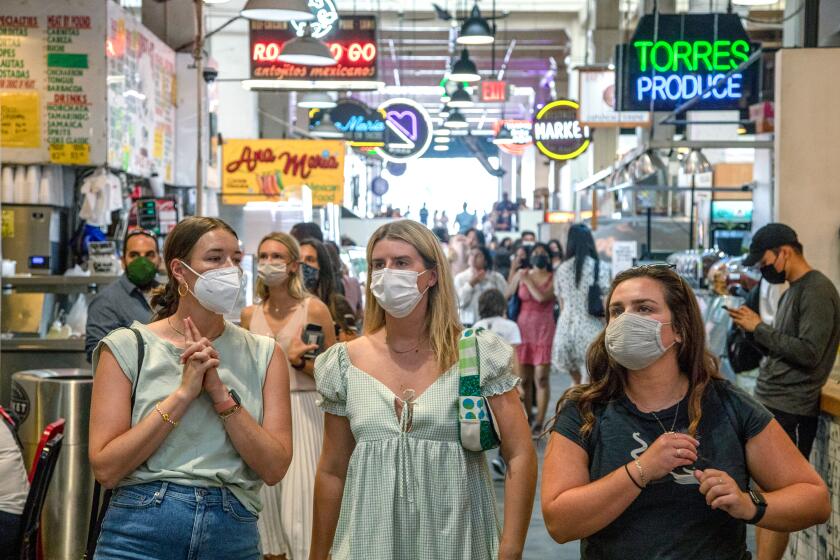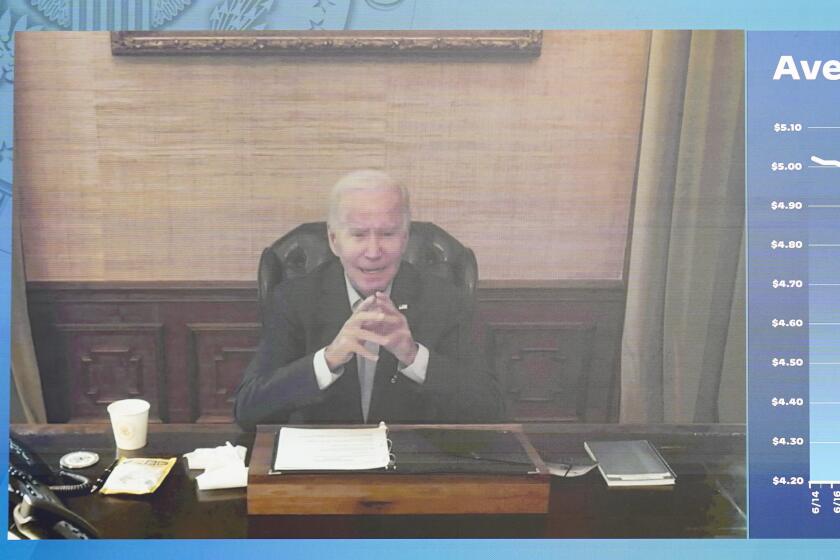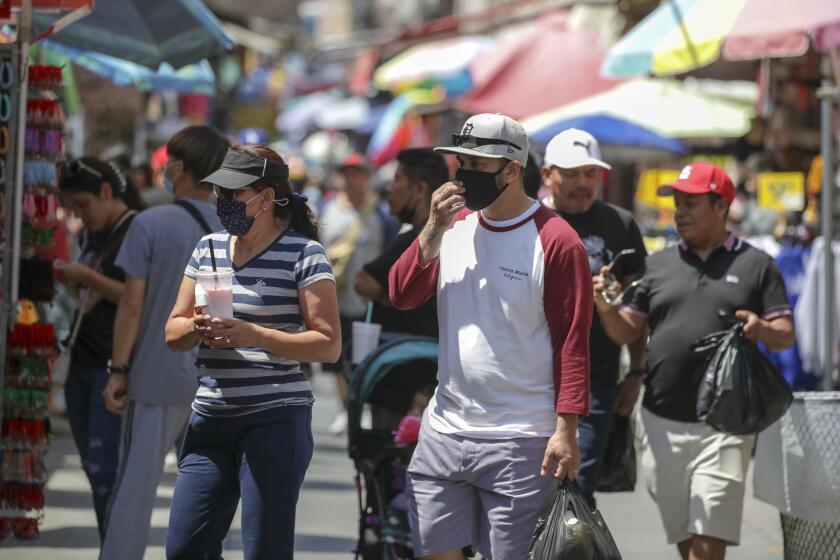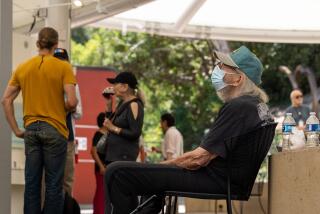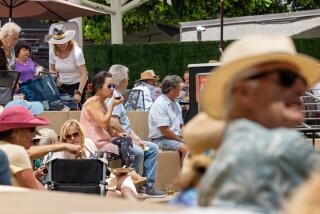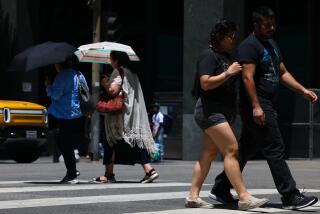Column: Do we get our lives back now, or are we going back down the COVID hole?
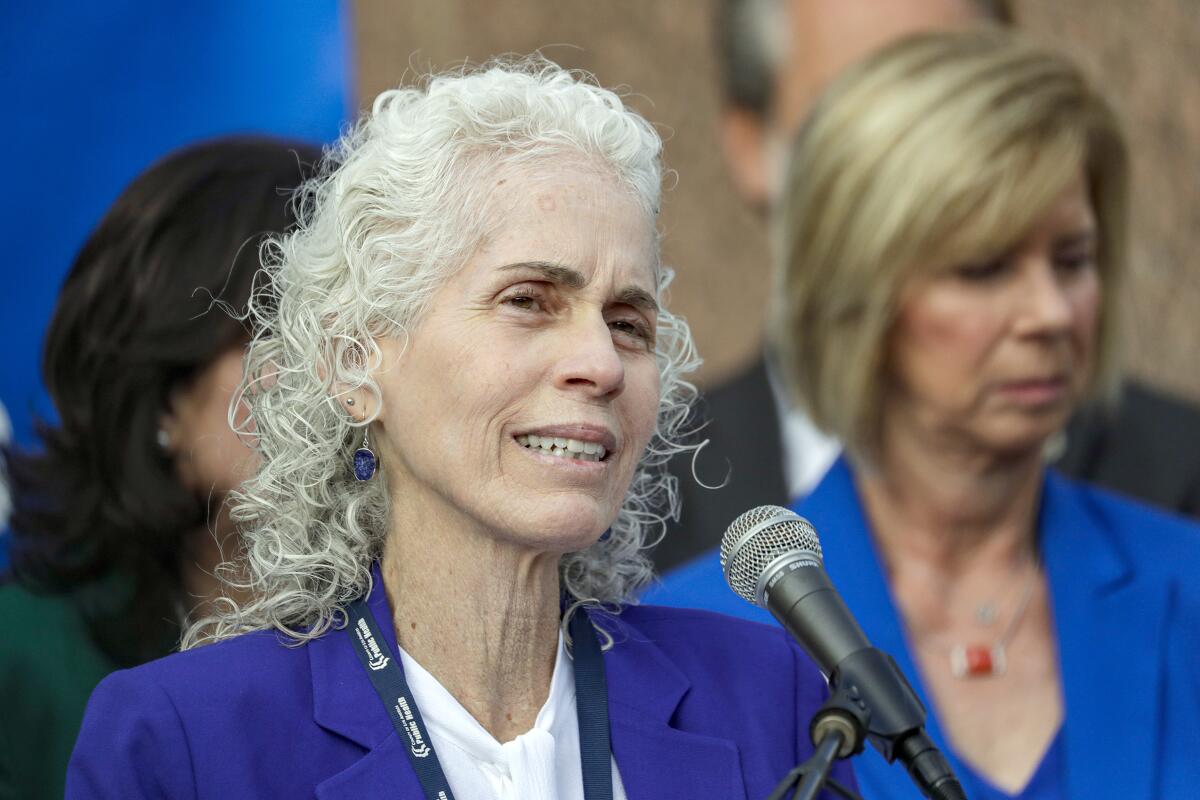
When Times reporters went to the Westfield Valencia Town Center in Santa Clarita last week they found the mall crowded with shoppers, virtually none of them wearing masks. Social distancing was forgotten. It was business as usual, the status quo ante.
That may sound strange given that COVID-19 has been spreading rapidly since March, with cases now at highly elevated levels and “super-contagious,” “ultra-infectious” new subvariants causing more breakthrough infections in vaccinated and boosted people than earlier versions, according to The Times.
But that’s the way it is. Across Los Angeles and all around the country, people are shrugging defiantly at the latest surge. They’ve gone back to living their lives. Only 13% of Americans say they’re very concerned about getting COVID and landing in the hospital.
“I’m over it,” said Hailey Jimenez, who works at the mall.
Opinion Columnist
Nicholas Goldberg
Nicholas Goldberg served 11 years as editor of the editorial page and is a former editor of the Op-Ed page and Sunday Opinion section.
The result, says The Times, is a “palpable disconnect between alarmed scientists and health officials focused solely on the infectiousness and mutations of the virus and a public that is increasingly less concerned.”
This week L.A. County officials will decide whether to impose a new indoor mask mandate, depending on how high case numbers and hospitalizations are.
But there’s concern that if they do, Angelenos will rebel and won’t mask up. Why? Because, like Jimenez, they’re “over it.”
“That’s my biggest fear,” Los Angeles County Public Health Director Barbara Ferrer told the New York Times. “That we’re so anxious to be done with this virus that we’re getting complacent.”
So who is right and who is wrong in this debate? Is the alarm of public health officials appropriate? Are new restrictions necessary, or will they backfire? Is Jimenez irresponsibly complacent or onto something Ferrer is missing?
The idea of a new indoor mask mandate, which could come in days, sparks a growing debate, with some L.A. communities saying they won’t enforce it.
All through the pandemic I’ve trusted the experts and followed the rules. But these days I see where Jimenez is coming from too.
I’ve grown a bit complacent myself. Since being vaccinated and boosted, I’ve resumed my life, up to a point. I’ve stopped washing my hands every 10 minutes. I’ve eaten indoors in restaurants and traveled on airplanes full of unmasked people. I’ve hugged old friends, I’ll admit it.
And I believe I was right to do all that.
Conditions have changed. We’d be crazy to feel the same level of fear today that we did before we had vaccines and therapies that dramatically lower the risks of contracting the virus and reduce its severity.
It doesn’t take a PhD in public health to see that the cost-benefit calculations have shifted considerably.
Cases in Los Angeles and nationally have been climbing — driven by a surge in the BA.5 subvariant. But for those who are vaxxed and boosted, cases are generally milder. The new subvariants are highly transmissible, but they’re less virulent than Delta was.
Although COVID deaths in L.A. County went from about 50 per week in June to 100 in July, that’s still a fraction of the 500 deaths a week tallied during the initial Omicron winter surge.
Last week, my 90-year-old father tested positive. Two years ago that would’ve been catastrophic news. But in the end he was tired for a few days, had some aches and a cough, and now he’s on the mend.
That’s because he’s been inoculated. My father’s conclusion? “This is the most overrated disease.”
President Biden’s physician, Dr. Kevin O’Connor, says Biden continues to ‘improve significantly’ despite a lingering sore throat.
But the issue isn’t that it’s overrated. It’s that for all intents and purposes, it’s not the same disease it once was.
“People aren’t being cavalier, they’re just reflecting where we are right now,” said Dr. Monica Gandhi, a professor of medicine and infectious diseases at UC San Francisco. “Originally we were scared about COVID because it caused severe disease. But now even as the cases go up, the rates of severe disease are so much lower than they were. People are right to feel more relaxed.”
I do feel more relaxed. But here’s the flip side.
I don’t want to behave irresponsibly. COVID-19 is still dangerous. In the first half of this year, it killed twice as many people in L.A. County as typically die from drug overdoses, the flu and car crashes combined.
A recent L.A. Times story noted that the county’s weekly death rate from the virus is nearly 70% higher than that in the Bay Area.
And there’s still long COVID to worry about. I was shocked to learn that 1 in 13 Americans was suffering from long COVID in early July. That means they’ve had symptoms for three months or longer.
Additionally, the more the virus is floating around in the population, the greater the opportunity for further mutations, which could lead to new, more severe variants.
L.A. County coronavirus weekly death rate 70% higher than in Bay Area: Why so much worse?
So even though I’m far less panicked than I was, I’m still willing to take relatively simple precautions. If Ferrer tells me we’ve hit some threshold that calls for indoor masking, I’ll follow the instructions on the simple grounds that she knows more about it than I do.
No one likes to mask, but there are worse things.
In recent days, cases and hospitalizations have finally begun to decline in the county, and it is just possible we may be spared from a new universal indoor mask mandate. But whichever way it goes, public officials need to communicate more effectively to make sure they don’t squander the public’s trust.
Frankly, it’s worrisome that trust in medical scientists dropped by 10 points during 2021, according to the Pew Research Center. In a January NBC poll, only 44% of Americans said they trusted what they’d been told about COVID by the Centers for Disease Control and Prevention.
Health officials need to mind their tone. They need to explain why, if deaths are down from their peaks and vaccines and therapies are effective, we might still be asked to make sacrifices to fight the virus. They need to be careful to not sow panic or give the impression they’re crying wolf.
If precautions are still necessary, they need to clearly tell us why.
In return, I think — I hope — most people will follow the rules.
More to Read
A cure for the common opinion
Get thought-provoking perspectives with our weekly newsletter.
You may occasionally receive promotional content from the Los Angeles Times.

